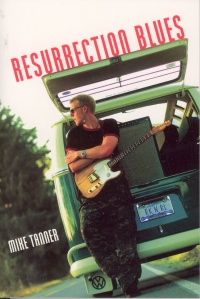| ________________
CM . . .
. Volume XI Number 21 . . . .June 24, 2005
excerpt:
Here's a book for those many high school students (usually boys) who think that school's a drag and playing in a professional rock and roll band would be the epitome of career choices. If you play guitar long enough and hard enough, they will come. What happens to you is another story. Flynn, 18, has been tapped on the proverbial shoulder and asked to take on the guitar part of a well-known local band, the Sawyers, as they play in the bars up and down the coast. He happily drops out of his final year of high school, despite parental anger and his girlfriend Julianne's uneasiness, and jumps headlong into a very adult world of sex, drugs, and rock and roll. Every once in a while, the band returns to Flynn's home town where he re-connects with his best friend Ramzi, an entrepreneurial, slick organizer of illegal raves, and with his rich girlfriend who is totally focused on graduation and first year university. Thrilled with the freedom to make his own decisions and the excitement of the music, Flynn finds himself approached by band groupies, entranced by Allie, an older woman singer, and sucked into a bad acid trip. He watches the older men in the band seduce different women nightly but backs away from group sex. When his expensive guitar is stolen, he is taken by a con artist who sells him a bad copy of a well-known instrument. As Julianne distances herself from him, Flynn yearns to contact his great uncle, for whom he is named a free spirit, a musician wandering from place to place, whom Flynn remembers fondly as the one who started him on the guitar at seven years old. Surely he will understand his grandnephew's band life. However, their eventual meeting is a shock as Flynn senior, who really can't play the guitar well at all, is revealed as a bombastic drifter who can provide Flynn with nothing, not even his support. This epiphany leads Flynn to compose "Resurrection Blues," a song about the end of your old life and the beginning of a new life. Flynn leaves the band, travels up north and begins to teach guitar lessons out of a music store while he learns to write songs. Flynn is an entirely believable older teenager who can't find experiences at home or school that excite him. He finds life boring and shies away from any responsible, traditional ways to mature. Playing guitar releases him from expressing his emotions in words. His friends, both Julianne and Ramzi, approach this child-adult transition differently. Julianne finds growth in family situations and in a consumer action group. Ramzi masters the risk of the business world and provides the sounding board for Flynn's angst. The band members are more stereotypical, from the twin band groupies to Lenny the sex addict, Keisha with her many boyfriends and Devlin the rigid, self-serving leader of the band. Flynn's character changes from awe-struck band worshipper to jaded, clear-eyed understanding of the sordid nature of much of life on the road. In the end, he can walk away from this life, having seen it without being totally contaminated by it. There isn't much plot here: innocent boy finds band life initially exciting but ultimately grim. The setting could be anywhere on either coast of North America on the small town band circuit. It's the music and the characters that dominate Resurrection Blues. And there are many descriptions of how the band plays its gritty '60's choices that will excite the heart of any guitar player. Resurrection Blues contains a great deal of modern dialogue that moves the story and characterization along. Told in the ubiquitous first person present tense, this novel creates a tone of urgent immediacy that reflects young adults' impatience and self-centeredness. Flynn's sojourn with the band helps him to break away from parental expectations and find his own solution to what to do with his life. This theme of finding your life path will resonate with older teens in the same position. Some may be put off by the casual sex, the heavy drinking and open drug taking that are an integral part of the story. For others, it will represent a reality that will affirm Flynn's choices. For band wannabees, Resurrection Blues could be a serious wake-up call. Recommended. Joan Marshall is the teacher-librarian at Fort Richmond Collegiate in Winnipeg, MB.
To comment
on this title or this review, send mail to cm@umanitoba.ca.
Copyright © the Manitoba Library Association. Reproduction for personal
use is permitted only if this copyright notice is maintained. Any
other reproduction is prohibited without permission.
NEXT REVIEW |
TABLE OF CONTENTS FOR THIS ISSUE
- June 24, 2005.
AUTHORS |
TITLES |
MEDIA REVIEWS |
PROFILES |
BACK ISSUES |
SEARCH |
CMARCHIVE |
HOME |
